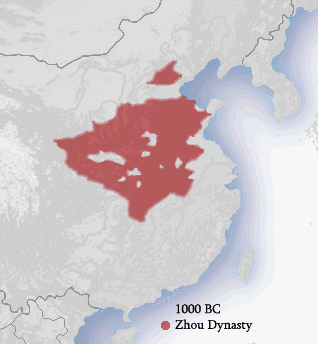Zhou Dynasty Facts For Kids
The Zhou Dynasty (1046–256 BC) was a pivotal era in ancient China that laid the foundation for Chinese philosophy, political systems, and culture.
Set reading age
View for Kids
Easy to read and understand
View for Students
Clear, detailed explanations
View for Scholars
Deep dives and big ideas
Introduction
The Zhou Dynasty was a powerful time in ancient China that lasted from about 1046 BCE to 256 BCE! 🇨🇳 It is divided into two parts: the Western Zhou and the Eastern Zhou. The dynasty was known for expanding its territory and establishing a way of ruling called the "Mandate of Heaven." This meant that the rulers were thought to have permission from the gods to rule. The Zhou Dynasty was also famous for creating important ideas and inventions, so it set the stage for many things we know today! 🏯🌟
Gallery of Zhou Dynasty Facts For Kids
Social Structure
The Zhou Dynasty had a unique social structure! 👩👧👦 At the top were kings and nobles who owned lots of land. Then came the artisans and merchants who made and sold goods. Farmers were very important too, as they produced food for everyone. In fact, around 90% of the people were farmers! The knowledge and skills they shared helped society grow. Additionally, there were slaves at the bottom, who worked for the nobles. This social order helped keep the dynasty running smoothly. ⚖️👩🌾
Decline And Legacy
The Zhou Dynasty slowly declined due to internal conflicts and rivalries among powerful states. 🎭By 256 BCE, the Qin state conquered the last Zhou area, marking the end of the dynasty. However, its legacy lives on! The ideas of Confucius and the principles of the Mandate of Heaven influenced future Chinese dynasties. The advances in farming, art, and philosophy that the Zhou established have had a lasting impact on Chinese culture, making it one of the most important dynasties in history! 🏆📅
Historical Context
The Zhou Dynasty came after the Shang Dynasty and was one of the longest-lasting dynasties in Chinese history! 🥳King Wu led a successful revolt against the Shang Dynasty around 1046 BCE, marking the start of the Zhou. This new dynasty ruled large areas, stretching across much of what is now northern and central China. The Zhou leaders created powerful alliances with other noble families to maintain control, using the Mandate of Heaven to justify their rule and secure their kingdom. 📜✨
Cultural Achievements
The Zhou Dynasty was a time of great culture and knowledge! 📚They produced many beautiful works of art, music, and literature. The famous philosopher Confucius, who lived during the later part of the Zhou, shared important ideas about ethics and morality. The Zhou also invented new styles of poetry and developed the first Chinese philosophy called Daoism. These cultural achievements shaped Chinese civilization and are still admired today! 🎨🎵
Political Organization
The Zhou were skilled politicians! They divided their land into different regions called "states," each ruled by a noble. 🌍These nobles were loyal to the Zhou king but had their own power over their regions. To keep control, the king sent officials to check on them. They also believed in the "Mandate of Heaven," which allowed them to overthrow kings thought to be unworthy or corrupt. This system helped maintain order and obedience in the vast kingdom. 🏛️🔍
Philosophy And Religion
Philosophy and religion played a big role during the Zhou Dynasty! 🕊️ People believed in many gods and ancestor worship. They thought that deceased family members could influence their lives. The teachings of Confucius emerged during this time, promoting respect, justice, and strong relationships among family members and society. Another important belief was Daoism, which focused on living in harmony with nature. These philosophies shaped the way people thought and lived in ancient China. 📖🌱
Technological Innovations
The Zhou Dynasty was full of innovators! 🛠️ They made important advances in farming, like using iron tools to help plant and harvest crops more efficiently. They also built impressive flood control systems to keep fields safe from water damage. The artisans created beautiful bronze vessels for ceremonies, while artisans used silk to make clothing that was luxurious and famous across Asia. All these inventions helped improve daily life and sparked progress for future generations! 🌾✨
Interactions With Neighbors
The Zhou Dynasty made contact with many neighboring cultures! 🌏They traded goods like silk, bronze, and rice with various neighboring tribes. They also faced conflicts and battles with rivals, such as the Qin and other states in the Eastern Zhou. These interactions helped spread different ideas, foods, and customs throughout China and even beyond its borders, creating a rich tapestry of cultures! ⚔️🔄
Did you know?
🏯 The Zhou Dynasty is known as the longest-lasting dynasty in Chinese history, lasting over 800 years.
📜 It is divided into two main periods: the Western Zhou (1046-771 BCE) and the Eastern Zhou (770-256 BCE).
🌱 The Zhou Dynasty introduced the concept of the 'Mandate of Heaven,' justifying the ruler's right to govern.
⚔️ The period saw significant developments in warfare and military strategy.
⚖️ The Zhou Dynasty contributed to the development of Confucianism and Legalism as influential philosophies.
🏺 Bronze casting reached its peak during the Zhou Dynasty, leading to advanced tools and ceremonial vessels.
💼 The feudal system was established, dividing land among nobles who owed loyalty to the king.
📈 Trade and commerce flourished during the Eastern Zhou period, leading to economic growth.
🔍 The Zhou Dynasty is often considered a cultural golden age marked by advancements in art and literature.
🗡️ The Warring States period (475-221 BCE), the latter part of the Eastern Zhou, was characterized by intense conflict among rival states.
Zhou Dynasty Facts For Kids Quiz


Make things. Learn new skills. Share safely.
DIY is a creative community where kids draw, build, explore ideas, and share.
No credit card required

